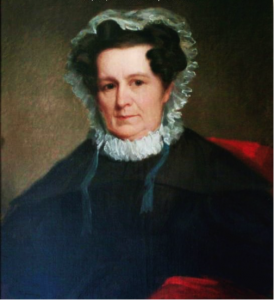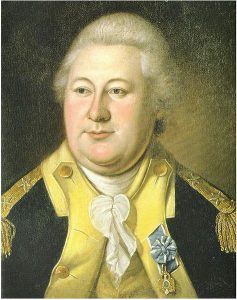Book review: The Revolutionary War Lives and Letters of Lucy and Henry Knox by Phillip Hamilton (Johns Hopkins University Press, 2017)
When we think of famous couples of the American Revolution, we often first think of John and Abigail Adams. Their correspondence was one of wit and intellect, spanning the crucial years of the war and early Republic. The Revolutionary War Lives and Letters of Lucy and Henry Knox by Phillip Hamilton, however, sheds light on the less popular, but wholly devoted and loving marriage of Gen. Henry Knox and Lucy Flucker Knox.
Lucy Flucker, the daughter of a prominent Boston Tory family, was just seventeen when she married a Whig bookseller, the twenty-three-year-old Henry Knox. Lucy would go against her family’s wishes with this course of action, setting in motion an early marriage of loneliness and feelings of abandonment. Thomas, Lucy’s father, served as Royal Secretary of the Province of Massachusetts. The rest of the Flucker followed Loyalist suit, but Lucy had other plans. Her decision to marry the Sons of Liberty sympathizer created a rift that would never be fully mended. Soon after the outbreak of war, the Fluckers fled the country, leaving newlywed Lucy behind without a word.
Lucy’s disownment by her family understandably left a grave impact, for her letters to Henry constantly speak of her loneliness and her desire to be by her husband’s side despite the danger. Lucy even tried to contact her family on several occasions, only to be met with cold silence. The division of the Flucker family speaks to the notion that the American Revolution was very much a civil war. Lamenting that the war had pitted “brother against brother,” Lucy wrote that it was a “pity the little time we have to spend in this world, we cannot enjoy ourselves and our friends, but must be devising means to destroy each other. The art of killing has become a perfect science. That man is most esteemed who has the best knack at destroying the human species.” Henry astutely agreed, explaining he “dislike[d] the mode of making war like Savages. War has horrors enough which are inseparable from its nature, [and] we ought [to] try every means in our power to endever to soften its rough visage.”

Both Henry and Lucy make known their distaste for war not only for the physical hardships, but also the emotional hardships. Marrying young and suffering a separation not long after marriage, Lucy and Henry seem to have both had relationship insecurities. Nearly every letter back and forth is filled with accusations of not having written enough or as often as the other would have liked. Both Henry and Lucy consistently asked each other for reassurances of love. Lucy’s familial abandonment made her anxious state unsurprising, as all she truly had in the world for family at that time was her husband and young daughter Lucy.
Henry conducted himself as an intelligent, well-read military man (although largely self-taught, having left school at twelve to support his family), but his introspective and romantic side shone when he wrote to Lucy. Like young lovers, the Knoxes often wrote in flowery language to constantly express their love for each other. Henry, frustrated with the situation, declared: “I maledict the man who first brought on this war only because it separates me from my Love,” and later argued that “no man on earth seperated from all that he holds Dear on earth has ever suffer’d more than I have suffer’d in being absent from [Lucy] whom I hold dearer than every other object.” Henry addressed Lucy as “the animating object of [his] life,” and admitted to her that he attempt[ed] to talk to [her] … but alas forty miles [away], she can’t hear me … I am allways talking inwardly to her. I think of rarely any thing else. Indeed, my dear Girl, I love you too well to be seperated from you at all.” Lucy ardently matched his romanticism, writing that Henry was “allways in [her] thought” and his “image is deeply imprinted on [her] heart … whom [she] love[s] too much for [her] peace.”
But marriage was not all roses for Lucy and Henry during their long separations. They sometimes quarreled by letter, their insecurities in absence no doubt getting the better of them. Lucy often requested Henry to send for her, as the other generals did with their wives, writing “out of the last sixteen months, we have not been six weeks together, and it is now eight months since we parted.” Lucy continually compared their relationship to that of the other Continental generals, using the wife of General Greene and the frequency of which the Greenes allegedly saw each other as leverage. Henry chided Lucy for being resentful of Mrs. Greene, and asked Lucy to nip any potential conflict in the bud by warning her to “beware of busy bodies, they are the greatest pests of society. I have a great respect and friendship for [General Greene]. It is impossible it should mature if you and she are at variance. Therefore, for the sake of me, smother any little matter which you may think an injury.” Despite Henry’s chides here and there, Lucy seems to have found her own confidence and independence as the war years went on. For example, she referred to herself as a “woman of business” when requesting to oversee Henry’s financial affairs, as well as shrewdly explaining to Henry the hardships on the home front in the way of low supplies and high inflation when Henry asked for unattainable items.

Overall, these letters illustrate the equal partnership of the Knox marriage. The military and business content in Henry’s letters shows that he appreciated, respected, and recognized Lucy’s intelligence in her own right. Most men of the time would likely not think such business something to discuss with women, or something they could even understand. Henry’s honesty in this matter illustrates their closeness; a true appreciation for each other made everlasting due to the long separations of their early marriage.
The Revolutionary War Lives and Letters of Lucy and Henry Knox is an extraordinary primary source of military movements and life, social customs, economic changes and hardships, and domestic life during the American Revolution. Henry and Lucy wrote to each other in an accessible and easily understood manner, making comprehension easier as well as helping the reader relate to this married couple–not so different from married couples of today. Historical letters often bring humanity and emotion to the cold facts of history. Furthermore, Phillip Hamilton adequately provides historical context to the letters and their writers, as well as offering insight and interpretation of Lucy and Henry’s words. Not only will this rich historical record aid researchers, but also historical fiction authors looking to capture the flavor of language and society during this time.







Recent Articles
Supplying the Means: The Role of Robert Morris in the Yorktown Campaign
Revolution Road! JAR and Trucking Radio Legend Dave Nemo
Those Deceitful Sages: Pope Pius VI, Rome, and the American Revolution
Recent Comments
"Texas and the American..."
Mr. Villarreal I would like to talk to you about Tejanos who...
"Trojan Horse on the..."
Thank you Eric! I should say that I have enjoyed your work...
"Trojan Horse on the..."
Great article. Love those events that mattered mightily to participants but often...